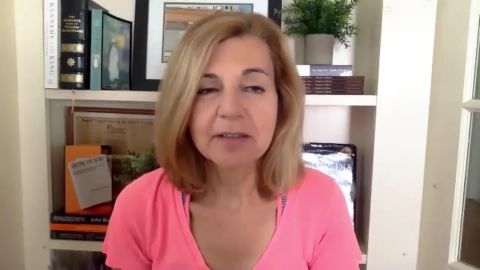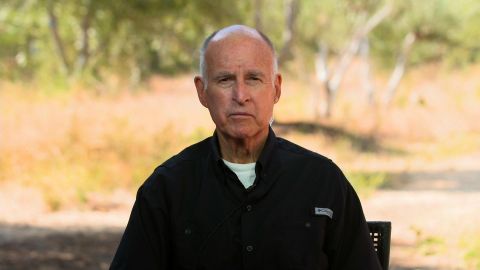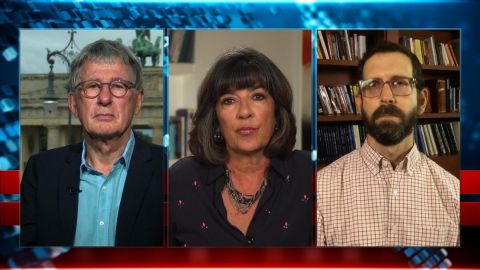Read Transcript EXPAND
CHRISTIANE AMANPOUR: And, now, this global pandemic has hit nearly every industry, including local journalism, which was on shaky ground before coronavirus. It’s something our next guest is deeply concerned about. Margaret Sullivan is a media columnist for “The Washington Post.” And her new book, “Ghosting the News: Local Journalism and the Crisis of American Democracy,” sounds the alarm on the disappearance of local media outlets. And, here, she’s speaking to Michel Martin about how this endangers society and what needs to happen now, before it’s too late.
MICHEL MARTIN: Thanks, Christiane. Margaret Sullivan, thank you so much for joining us.
MARGARET SULLIVAN, “THE WASHINGTON POST”: Thank you very much for having me.
MARTIN: You started your career at “The Buffalo News,” starting as an intern, rose to executive editor. Then you became a public editor for “The New York Times.” Now you’re a media columnist for “The Washington Post.” So, you clearly have kind of the full sweep of the thing. Why do you like covering the news, to the point that you have spent so many years, really your entire adult life, doing it?
SULLIVAN: Exactly. Even before my adult life, I was actually the editor in chief of my high school paper. I mean, it just really suits me. I think it’s — it has a — journalism and newspaper journalism, but not just newspaper journalism, has the ability to have you doing something that’s really worthwhile and even maybe a little noble, working at one of the underpinnings of our democracy, but also in a thing that’s always interesting, where you’re always learning. No two days are alike. And I just — I mean, I can’t imagine doing anything else. And I can say that, while I have had a lot of tough days in journalism, I have never had a boring day.
MARTIN: You’re talking about a lot of people’s tough days in journalism. Your book “Ghosting the News: Journalism and the Crisis of American Democracy” paints a very disturbing picture of — how bad is it?
SULLIVAN: Well, it’s worth kind of reviewing just a couple of the top-line numbers here, one of which is that, since 2004, more than 2,000 American newspaper haves closed their doors and stopped the presses and gone out of business. A lot of those are weeklies, but some of them are dailies, and that American newsrooms are down by about and maybe now more than half their employment from that time, 2004. So we’re really — and this is not just about newspapers. This is newsrooms. We’re really seeing an incredible shrinkage and decimation of the local news — you know, the whole local news system that has helped people feel connected to their communities, like they know what’s going on, keeping track of their public officials. All those things that we really need to be good citizens are going away. And the reason for that is that the business model, in my cases, has really just disintegrated.
MARTIN: And what is that. What is that business model that’s disintegrated?
SULLIVAN: So, for a long time, the business model, which was highly successful, was print advertising, the car dealers, the supermarkets, the travel agencies, on and on, and classified advertising. If you wanted to sell something, you came to the local newspaper. That was about three-quarters of the revenue of these newspapers. And then the other piece of it, maybe as much as a third, would come from subscriptions. So, then, the Internet come along. People’s habits change. There are more direct and targeted ways of getting to your — for advertisers to get to their audiences. And the whole thing started changing in the early 2000s. Then 2008 comes along, the recession, and that really knocked newspapers for a loop. And we thought things were pretty bad, and they were, and then much more recently, with the coronavirus pandemic, another layer of — sort of another acceleration of the pace has happened. And Axios is reporting that 11,000 newsroom employees have lost their — or I guess news organization employees have lost their jobs since the beginning of the pandemic. So, this is really a crisis. And it’s also weird because people — regular people, laypeople, non- journalists, don’t really understand that it’s happening. A Pew study not too long ago said that something like 70 percent of their respondents said they thought that local news organizations were doing fine financially. And there’s good reason for people to think that, because they were so successful for such a long time. I think that people’s views haven’t caught up with the reality. And that’s one of the reasons I wanted to write this book, to sort of sound the alarm before it really is too late.
MARTIN: And why does this matter? I mean, really this is the crux of thing.
SULLIVAN: Yes.
MARTIN: Why does this matter? Because I think people will turn on their televisions or fire up their computers, there will be some news on it.
SULLIVAN: Absolutely.
MARTIN: There’s going to be something on it, right?
SULLIVAN: Right. I mean, there’s a ton of national news. There’s so much national news, especially political news, coming at us at all times, that we feel daunted by it. And I have heard, and I’m sure you have to, heard people say, I’m done with all this news. I’m turning it off and am putting myself on a news diet. And that is true. There is a ton of national political news and other news. But what there is less and less of all the time is that regional news, particularly the watchdog coverage of our local public officials that keeps them honest, that tells us where our tax dollars are going, how our kids are going to be treated in school and, more recently, the coverage of the pandemic on a local level, how — we saw “The Miami Herald” did a really good piece the other day — and this is great local journalism — where they took the poorest zip code in the Miami metro area and drilled down into how COVID was affecting people there. Now, that’s not anything you’re going get from this fire hose of national information. And it’s the kind of that I think that local journalists can do. And, similarly, again, another great “Miami Herald” piece of reporting, the reporting about Jeffrey Epstein, the sex trafficker. Julie Brown is really the one who took that story out of — off its deathbed and revivified it and caused a lot of justice to occur. If we don’t have those local news outlets and those skilled reporters, we’re not going to have those stories.
MARTIN: Are we talking about local newspapers or are we talking about local journalism? Are they one and the same?
SULLIVAN: Great question. And I always try to make this distinction. We are talking about local newspapers, but we’re also talking about — I mean, we need to be talking about all local journalists, public radio, TV stations, newspapers, digital startups. These are all a part of the local sort of news ecosystem. Newspapers are suffering the worst, but some of the others are really hurting too, not so much TV. TV has some other forms of revenue, which tend to shore it up a little bit better. But all the others, I would say, are having a really tough time right now. And local TV can do some important work, no question, but it doesn’t really do the same kind of granular, cover the city council, develop your sources, necessarily, that newspapers are kind of built to do.
MARTIN: People are used to see their local TV folks showing up at the big stories. They do show up at the county council meeting and so forth. What’s so terrible?
SULLIVAN: Well, it’s not that they don’t show up. And I — this is in no way putting TV reporters down, because I think they have done some really good work, and more and more, they’re doing enterprise and investigative work. But in general and over time, they haven’t done the same kind of daily digging, source development. They haven’t — they tend to show up places, get the footage, maybe dig in a little bit, whereas you might — at a regional newspaper, you probably had someone who was devoted to covering just city hall, and they had an office at city hall, and that’s what they did. It was much more likely that they were going to turn up the dirt and get the tips because they were there all the time.
MARTIN: Can you give an example, even perhaps in your own career, of why having robust local journalists who master their beats, get to know the story really matters, and what is lost when that is lost?
SULLIVAN: Yes. So, just as a sort of dramatic example just sort of the numbers, if you look at Denver, Colorado, so, for many years Denver’s local news ecosystem was dominated by two newspapers, “The Rocky Mountain News” and “The Denver Post.” And they each had 300 people. And they were — so, 600 people in these newsrooms who were able to really spread out across the state and do really good coverage. Then when “The Rocky Mountain News” went out of business about 10 or 12 years ago. And now The Denver Post is owned by a hedge fund, which is a trend that’s happened, and it’s been a really awful trend. And they’re down to well under 100. I think they may be down to under 50 in their newsroom. So, let’s say they have 60. You’re down from 600 to 60. That is literally decimation. They’re down to a 10th. And so can they cover things the way they used to? No, they really constant. I think one of the things that makes this hard to talk about is that we don’t know what we don’t know. You don’t know the stories you’re missing. But one thing that’s happened in East Lansing, Michigan, is this woman Alice Dreger decided that there wasn’t any local coverage there, or very little. Lansing was getting covered, but not East Lansing. So she started up this kind of amateur brigade of people, retirees and moms who worked at home and dads who worked at home, and she trained them do solid reporting. And they have turned up a lot of news there. And she said, you might think nothing’s happening, but when you start to dig for it, there’s actually a lot, and a lot of bad behavior on the part of public officials. So, when you have the people to do the work, they turn up some amazing stuff.
MARTIN: One of the points you make in your piece is that it really does — a lack of local coverage really affects people’s sense of self as citizens. It really affects their civic engagement. It even affects their kind of willingness to participate. Why is that?
SULLIVAN: Well, I think that we need to have in communities and regions kind of a basis of facts that we all function from. And while we might have different points of view about what to do about those facts, because we may have different political perspectives, we can all agree that there’s erosion happening on the shore of Lake Erie, or whatever, the Great Lakes are in trouble because of pollution, whatever that may be. But when we’re not getting that information, we sort of retreat into our partisan corners. We become much more tribal. We don’t vote across party lines anymore. And, in fact, we vote less and become less politically engaged. There are studies that show this. And, interestingly, too, when local news goes away, municipal borrowing costs actually go up. Why? Because there’s no watchdog, and there’s an assumption that — and a reasonable assumption, that government is going to be less efficient and possibly more corrupt.
MARTIN: You write about the story of the election of Congressman Collins as an example of why local news is important. Could you talk a little bit about that?
SULLIVAN: Sure. So, Chris Collins, who was a congressman until quite recently in the Buffalo area, although not in Buffalo proper, but in kind of a rural and really very Republican area that spans a number of counties in Western New York, was indicted on insider training charges. But he was nevertheless running for reelection. And his Democratic opponent told me that, in places where the news coverage was stronger — and he describes this as being closer into the city of Buffalo, where newspaper and TV stations and others still exist — that people were more willing to cross the aisle and vote for a Democrat. And he said that, as he got out into more rural areas, particularly one that’s described by the University of North Carolina as a news desert, a place where there isn’t much, if any, local news, he said, there, people didn’t even necessarily know even that their congressman had been indicted. Now, I have since found out that there’s a small digital in Orleans County called Orleans Hub, and they did a lot of coverage. Was that coverage getting to the voters? I don’t know. But there did seem to be at least an anecdotal tie between people being willing to cross the aisle and vote for someone on the other side because they were very well-informed, vs. being in a place where there’s less local news. And this guy, Nate McMurray, said he would tell people, you don’t want to vote for someone who’s been indicted on insider trading charges, do you? And they would say, that’s not — what? I have never heard of that. And, anyway, it’s fake news. So, after the election took place, and Congressman Collins did win reelection, but by a whisker. He won by one-half of 1 percent, which is far smaller than he normally would have, because the district is so Republican. Later, he — the case went to trial. He pleaded to two felonies, and he was sentenced to a jail term. So, I think the more informed people are — we know this. The more informed people are, the more willing they are to at least consider crossing the aisle to vote for someone, as opposed to staying in their tribal corners.
MARTIN: Now, I think people have become aware of, you said, hedge funds buying up these newspaper chains and then, what, doing what they do, stripping them immediately of as much value as possible, laying off people. But what about kind of the savior model? A number of very big money individuals have swooped in to buy certain news organizations. I think Jeff Bezos of Amazon may be the example most people know, buying “The Washington Post.” “The Washington Post” seems to be doing well. Is that an option?
SULLIVAN: They’re — I don’t actually believe this, but there aren’t enough of those kinds of billionaires to go around. I mean, not every place that he has a failing newspaper is going to be able to tap into those kinds of deep pockets. So it just doesn’t scale. It’s happened in a few communities. “The L.A. Times” is owned by a rich guy right now. So is the Las Vegas newspaper. And there are a couple others. But when you think that there are thousands of papers that have gone out of business, it’s very, very unlikely that there’s going to be a billionaire for every one of those, or even a multimillionaire who’s willing to start spending down his money to support a failing news organization.
MARTIN: So, what’s the alternative? What’s the way forward here?
SULLIVAN: Well, the way forward is a combination of things. It’s supporting these new organizations that are cropping up, Voice of San Diego, MinnPost in Minneapolis, Investigative Post in Buffalo, “The Texas Tribune,” all these new places that are coming up, and they have a membership model or a philanthropy model, and trying to salvage as much as possible local newspapers by getting people to support them, to subscribe, and hopefully to be able to help them negotiate a little bit better with the duopoly of Facebook and Google to get some of those important digital advertising dollars. So, it has to be a patch work of answers, also supporting public radio, also supporting TV stations, or being interested in them. It’s a lot of different things. It’s not going to be one answer. And I wish there could be a single great answer, but there just isn’t.
MARTIN: Margaret Sullivan, thank you so much for talking with us.
SULLIVAN: Thank you very much for having me. I appreciate being able to discuss this.
About This Episode EXPAND
Christiane speaks with former California governor Jerry Brown about current events. She also speaks with policing experts Joachim Kersten and Neil Gross about police reform. Michel Martin speaks with media columnist Margaret Sullivan about the importance of local news.
LEARN MORE


